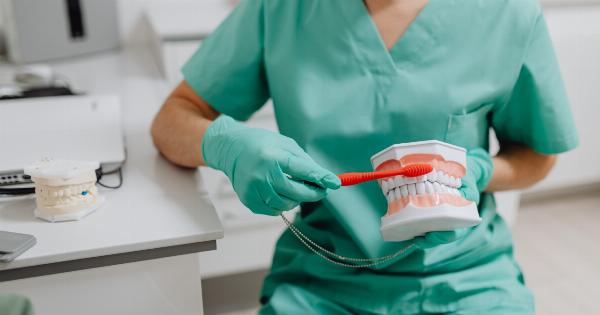Brushing your teeth twice a day is an important part of maintaining good oral health. However, there are certain tooth brushing mistakes that people often make without realizing it. These mistakes can actually increase the risk of cavities.
Here are some common tooth brushing mistakes that you should avoid:.
Using Too Much Pressure
One of the most common tooth brushing mistakes is using too much pressure. Brushing your teeth too hard can damage the enamel and make your teeth more vulnerable to cavities.
It can also irritate your gums and cause them to recede, exposing the roots of your teeth and making them more vulnerable to decay.
Using Hard Bristles
Another mistake is using a toothbrush with hard bristles. Hard bristles can be too abrasive and cause damage to the enamel. They can also irritate your gums and cause them to recede, which can lead to tooth sensitivity.
Brushing Too Quickly
Many people rush through brushing their teeth, thinking that a quick scrub is enough to get the job done. Unfortunately, this is not the case. You need to brush your teeth for at least two minutes to remove all the plaque and bacteria.
Brushing too quickly can leave some of the bacteria behind, increasing your risk of cavities.
Ignoring the Gum Line
Another common tooth brushing mistake is ignoring the gum line. Plaque and bacteria can accumulate around the gum line, so it’s important to brush this area thoroughly.
Neglecting the gum line can lead to gum disease, which can cause tooth loss and other health problems.
Using the Same Toothbrush for too Long
Many people continue using the same toothbrush for months or even years. However, toothbrushes wear out over time and become less effective at removing plaque and bacteria.
It’s recommended to replace your toothbrush every three to four months or when the bristles become frayed.
Not Brushing Often Enough
Some people think that brushing their teeth once a day is enough to maintain good oral hygiene. However, it’s important to brush your teeth twice a day to remove the plaque and bacteria that accumulate throughout the day.
Skipping a brush can allow the bacteria to proliferate, increasing your risk of cavities and gum disease.
Not Rinsing Your Mouth After Brushing
Many people forget to rinse their mouths after brushing, leaving behind toothpaste residue that can lead to the development of cavities. Rinse your mouth thoroughly after brushing with water to remove any remaining toothpaste.
Not Using Fluoride Toothpaste
Another common mistake is not using toothpaste that contains fluoride. Fluoride is a mineral that helps strengthen the enamel, making it more resistant to decay.
Brushing with fluoride toothpaste can help protect your teeth from cavities and promote better oral health.
Not Brushing Your Tongue
Brushing your tongue is an important part of maintaining good oral hygiene. Bacteria can accumulate on the surface of your tongue, leading to bad breath and other dental problems.
Use your toothbrush or a tongue scraper to clean your tongue every time you brush your teeth.
Not Using Proper Technique
The technique you use to brush your teeth is also important. The American Dental Association recommends using a circular motion to brush your teeth and aiming the bristles at a 45-degree angle towards the gum line.
Be gentle and use light pressure to avoid damaging your teeth and gums.
Conclusion
By avoiding these common tooth brushing mistakes, you can help protect your teeth from cavities and other dental problems.
Remember to brush your teeth twice a day for at least two minutes with fluoride toothpaste, replacing your toothbrush every three to four months, and using proper technique. With good oral hygiene practices, you can enjoy healthy teeth and gums for years to come.




























